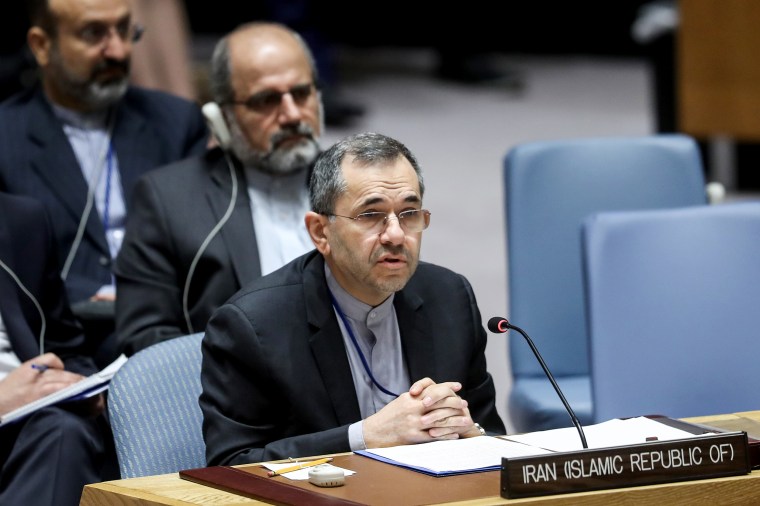In an interview with NBC News Friday, Iran's ambassador to the United Nations called the assassination of Gen. Qassem Soleimani "an illegitimate action" and "an act of aggression" in violation of international law. Amb. Majid Takht Ravanchi also said that although he believes the Trump administration "does not believe in dialogue," Iran and the U.S. have exchanged letters through a Swiss emissary since news of the assassination broke late Thursday.
Ravanchi declined to elaborate on those letters, but said Soleimani's killing will be met with "harsh revenge" by Tehran.
Soleimani was the leader of the Quds Force, an elite Iranian military and intelligence unit, and one of the country's most powerful military and political figures. The drone strike, which occurred early Friday morning Iraq-time near Baghdad International Airport, also killed Abu Mahdi al-Muhandis, said to be a close adviser to Soleimani and the deputy of the militias known as the Popular Mobilization Units.

President Donald Trump and the Pentagon have pointed to Iran as the source of attacks against U.S. servicemen and the U.S. Embassy in Baghdad late last month, and stated that Soleimani had imminent plans for additional attacks against U.S. interests in the Middle East.
"For years, the Islamic Revolutionary Guard Corps and its ruthless Quds Force under Soleimani's leadership has targeted, injured and murdered hundreds of American civilians and servicemen," Trump said from his Mar-a-Lago resort on Friday, in his first public remarks after ordering the airstrike, adding that the recent attacks against U.S. interests in the Middle East "were carried out at the direction of Soleimani."
Ravanchi denied those claims. "They have not shown any evidence to support their arguments," he said, "and if they have any documents they should show it." He also pointed to a tweet from former National Security Adviser John Bolton, in which Bolton called Soleimani's assassination "long in the making."
"It shows that the U.S. government has been planning to assassinate Soleimani for quite some time," Ravanchi said.
'There will be harsh revenge'
Ravanchi said Soleimani was in Iraq at the request of the Iraqi government, and questioned the Trump administration's commitment to countering terror in light of Soleimani's killing.
"The U.S. cannot claim that it is fighting terror when at the same time it is killing the champion of defeating terrorists in our region," he said, alluding to Soleimani and Quds Force's successes against ISIS in Iraq and Syria.
After the Islamic State militant group (ISIS) gained a foothold in Syria and Iraq, the Quds Force helped to mobilize and lead tens-of-thousands of Shiite militiamen against the terror group. Soleimani and his commanders were on the front lines in Iraq and his name became synonymous with victories attributed to Iraqi ground forces.
"There will be harsh revenge," Ravanchi said. "Where? When? How? I do not know, but there definitely there will be some retaliation because it was an act of aggression by the United States and we cannot just close our eyes on what happened to a dear general of our armed forces."
The ambassador clarified that retribution would not be aimed at American civilians. "What we have said is that this action by the U.S. government, by the U.S. administration, has its own consequences," Ravanchi said. "They should bear the full responsibility of what will happen in the future."
Iranian Supreme Leader Ayatollah Ali Khameinei named Brigadier Esmail Qaani as Soleimani's replacement early Friday. Ravanchi said he does not anticipate that Qaani's appointment will change the direction of Quds Force or the Iranian Revolutionary Guard Corps, but in a statement that aired on Iranian state media Friday, Qaani said, "Be patient, soon you will witness the bodies of Americans in all of the Middle East."
Tensions between the U.S. and Iran — already fraught since the Trump administration's departure from the nuclear deal — have escalated drastically in the past month. On Dec. 27, a rocket attack on an Iraqi military base near Kirkuk killed an American contractor and wounded several American and Iraqi servicemen. The Pentagon blamed an Iran-backed militia called Kataib Hezbollah.
Three days later, American forces retaliated by killing 24 militiamen and wounding 50 more in airstrikes in Iraq and Syria. Then, on Dec. 31, protestors broke into the U.S. Embassy grounds in Baghdad, damaging theoutside of the compound and temporarily trapping American personnel.
In light of the embassy attack, the U.S. Department of Defense announced it is sending approximately 3,000 soldiers to the Middle East. U.S. defense officials said the deployments were not in response to the strike against Soleimani.